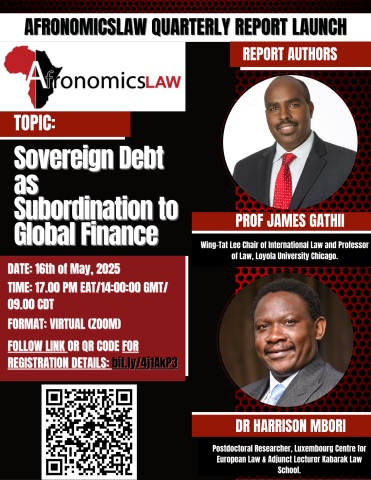
May 12, 2025
Join us for the launch of Afronomics Law's latest quarterly report, "Sovereign Debt as Subordination to Global Finance", by Prof. James Gathii and Dr. Harrison Mbori.
Zoom Registration Link here
Date: May 16, 2025
Time: 10am (Washington DC), 5pm (Nairobi), 4pm Johannesburg
Download the Report here.
Abstract:
Sovereign debt is generated by a global financial and debt architecture that subordinates Global South countries for profit. The recurrent debt crisis that Global South countries experience from time to time is not an aberration but a systemic feature of the global financial and debt architecture. Similarly, the ad hoc, temporary, and non-binding ‘soft’ law approaches designed to address the chronic indebtedness of Global South countries are not incidental but are integral features of a global financial and debt architecture dominated by the interests of private capital. This report traces how countries of the Global South have sought to counter their subordination within the global financial and debt architecture. For example, we trace Mohammed Bedjaoui’s vision and, in particular, his work as an International Law Commission (ILC) Rapporteur on state succession. We also trace United Nations Conference on Trade and Development (UNCTAD) proposals on sovereign debt justice in the 19th and 20th centuries. The report contrasts the radical approach represented in Bedjaoui’s work with two alternatives. First, we contrast the ‘soft’ law proposals to address the Global South’s indebtedness through ‘soft’ law principles. Second, we address ad hoc, temporary, and contract-based approaches favored by the Bretton Woods institutions and private creditors. In tracing these options for addressing the Global South’s subordination in the global financial and debt architecture, our goal is to show how Global North states, together with the Bretton Woods institutions and owners of capital, have, over the years, sought to deradicalize or defeat any efforts to transform the global debt and financial architecture. The session will include a presentation from the authors and a Q&A session.